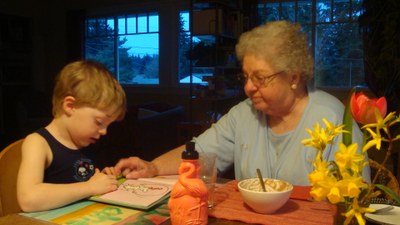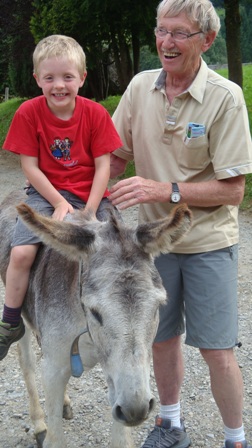A Frosting of Love

Hillary Rodham Clinton told us, and we remember, that “it takes a village to raise a child.” The first ─ and most important ─ part of that village is loving and responsive parents. Another important part involves a supportive community, which includes organizations like PEPS, and then down the parenting road, quality child care and schools, neighborhoods and the like. Another important component of raising children includes grandparents.
Parents need the support of grandparents to bolster them through the ups and downs of parenting. Children need grandparents to provide an additional element of unconditional love. And grandparents themselves enjoy a whole new dimension in their lives that only grandchildren can provide.
As with parenting, grandparenting is far different today than it was a generation ago. The days of being a doting, loving grandparent are not over, but they have been altered.
Whether a grandparent lives nearby or across the country, most witness significant differences between how they raised their children and how their children are raising theirs.
Many children sleep with their parents, don't learn to use the toilet until well after their third birthday, seem indulged with newfangled toys and are carted from activity to activity day after day; these are circumstances that would have occurred very rarely a generation or two ago. Many grandparents today complain that their grandchildren are ill-behaved and disrespectful, not only to their parents but sometimes to Grandma and Grandpa, too.
Then many well-meaning grandparents tending to their grandchildren can cause problems for Mom and Dad by undermining their authority, spoiling the children and not adhering to the rules and values of the parents. These indulgences can cause familial tension between the generations, ultimately affecting the children.
No matter the grandparenting circumstances, here are five tips for grandparents to follow to build a loving relationship with their grandchildren while upholding the parent-child relationship:
- No favorites allowed. It's not fair to show favoritism for one grandchild over another. Now, you might hold a special place in your heart for your oldest grandchild. It’s normal. After all, he or she provided the first experience for you of the intimate relationship between grandparent and grandchild; if that’s the case, so be it. Just don’t let any one else know about it. It’s your secret.
- Be careful not to undermine the parents’ authority. If the parents say, “No TV,” you better adhere to that rule. This goes particularly for rules that involve safety (this includes car seats), health (this includes food) or daily routines (this includes bedtime). It’s good to know, however, that children can adjust to the certain rules of their own home that differ from those at Grandma's and Grandpa’s. If, for instance, it’s OK to jump on the sofa at home, Grandpa can make a rule at his house that jumping on sofas is not allowed.
- There’s no need to compete for children's affection with the parents and other relatives, particularly the other set of grandparents. Children need love from lots of people. So uphold those other relationships important to the child while carving out your own unique relationship with each grandchild.
- Don't speak ill of either parent to your grandchildren. Even if a dad or mom has abandoned your grandchild, is an alcoholic, or is basically an ineffective and uninvolved parent, resist bad-mouthing the parent. Only take action if an unsafe or abusive situation occurs.
- When you disagree with how your son or daughter is disciplining your grandchild, it's OK to offer gentle suggestions sandwiched between 10 compliments and words of appreciation regarding the parenting job they’re doing. Use these lines:
"One thing I did with you kids was always have a consistent bedtime."
"I never tried to force or threaten you to eat anything; my rule was to make a meal with the food I set on the table."
"It always worked for me to ignore whining."
"For some reason time-outs rarely seem to change or improve behavior."
Make your suggestion only once. If your advice goes ignored, so be it.
 If, however, your grandchild sasses you or sneaks a cookie after you’ve told her no, feel perfectly justified reprimanding the child. No need to go on and on, just state your disappointment once, accompanied by "please don't do it again."
If, however, your grandchild sasses you or sneaks a cookie after you’ve told her no, feel perfectly justified reprimanding the child. No need to go on and on, just state your disappointment once, accompanied by "please don't do it again."
When you’ve spent a day with your grandchild, mention to the parents at least one funny story or one positive interaction with your grandchild. It’s very affirming to parents to receive positive feedback from their own parents as to how their child behaved. If there was one minor negative interaction between you and your grandchild, there’s no need to mention it. If a huge blowup or disciplinary situation challenged you beyond what seems normal, go ahead and discuss it with your adult child ─ but not in front of your grandchild.
Most important is to value and respect all of the relationships involved in the parent, child and grandparent triangle. The unconditional love grandparents provide is like no other. Children need emotional and physical protection to thrive; grandparents provide a frosting of love to seal children's feeling of security.
For optimal development, every child needs loving, committed parents. For parents to do their best job, they need their own parents to supply approval and support. And grandparents need appreciations for the care and love they provide.
Sometimes situations between parents, grandparents and children turn troublesome. What is your grandparenting concern or issue? Let me know and I’ll respond to you.
About The Author
 Jan Faull, M.Ed., has taught Parent Education for more than twenty-seven years. Jan's weekly column Parenting for The Seattle Times ran for ten years.
Jan Faull, M.Ed., has taught Parent Education for more than twenty-seven years. Jan's weekly column Parenting for The Seattle Times ran for ten years.
She is a recognized speaker to a wide variety of local and national organizations. Jan is the author of five books: Mommy, I Have to Go Potty (Raefield & Roberts, 1996); Unplugging Parent-Child Power Struggles: Resolving Emotional Battles with Your Kids Ages 2-10 (Parenting Press, 2000); Darn Good Advice-Parenting (Barrons, 2005); and Darn Good Advice-Baby (Barrons, 2005). Her latest book: Amazing Minds: The Science of Nurturing Your Child's Developing Mind was published in August 2010 by Berkley Books a subsidiary of Penguin.
Jan was a board member for PEPS (Program for Early Parent Support) and currently serves on the PEPS Advisory Board. The mother of three adults and grandmother to three granddaughters, Emilia, Flora and Violet and one grandson, George, she resides in Seattle.
- Sign up for our Grandparent newsletter, featuring topics relevant to grandparents
- Join our PEPS Grandparent Facebook Group
Document Actions